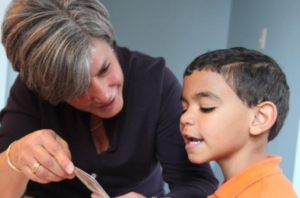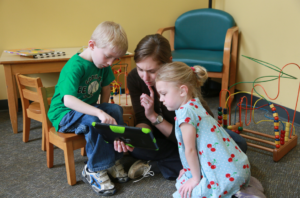FAQs & Resources
Need some help with identifying needs, working with your child, finding parent support, or other resources? Northeast Hearing & Speech is here to help.
Frequently Asked Questions
What does a Speech-Language Pathologist do?
A speech-language pathologist treats a variety of disorders, including expressive language (how one uses language) delays/disorders, receptive language (how one understands language) delay/disorders, speech sound production disorders (articulation/phonological, stuttering, social language/pragmatic disorders, and cognitive disorders as they relate to language. We work with a variety of clients across the lifespan, including children who are just learning to speak or are learning how to speak clearly, individuals with specific medical diagnoses (e.g., Autism, Down Syndrome, Cleft Palate), individuals who stutter, and individuals who wish to reduce or modify their accents.
What should I do if I think that I or my child has a speech-language delay?
It is recommended that you first discuss concerns with your primary care physician. For children, your pediatrician may be able to determine if your child is meeting developmental milestones. Typically, children will say their first word at 12-15 months and start combining words around two years of age, although this varies from individual to individual. In terms of speech sounds, you should be able to understand at least half of what your child says by age 2 and most of what he or she says by age 4. If you have concerns that your child has not reached these milestones or if he/she is showing frustration with communication, a speech and language evaluation is recommended. For more information about speech and language milestones and suggestions about how to help your child based on his/her age, check out the resources at the American Speech Language Hearing Association.
For adults, if you feel you are having trouble effectively communicating or understanding others, have a strong accent that interferes with others’ ability to understand you, or are experiencing stuttering, a speech and language evaluation is recommended.
For all individuals, having your hearing screened or evaluated is an integral part of the evaluation process.
How do I obtain an evaluation at Northeast Hearing & Speech?
To schedule an evaluation, contact our office at 207-874-1065 or book an appointment online.
- You will be asked to provide the name and date of birth of the person to be evaluated as well as their primary care doctor and insurance information
- For individuals who have previously participated in a speech language evaluation or who have received speech therapy in the past, you will be asked to bring in prior evaluation reports and/or other relevant documentation.
- If there are evaluation openings when you call, you will be offered a time to come in for the appointment.
- If there are no openings at that time or if you are unable to accept any of the times offered, you will be put on a waiting list for an evaluation. You will be contacted when another time is available.
If the evaluation appointment is made at least 5-7 days in advance, you will be sent paperwork to complete ahead of time and bring to the evaluation. This paperwork includes:
- A case history for adults or children
- HIPAA notification
- A client data sheet for adults or children
If the evaluation will occur within 3-5 days of booking, you will be asked to arrive 15-30 minutes prior to your scheduled time to complete the paperwork. If you have other evaluations or relevant documentation (previous speech and language evaluation, hearing, occupational therapy, psychological evaluation, documentation of a relevant medical diagnosis), you will be asked to bring these to the evaluation or scan/email/fax them to our office prior to the appointment.
If you have other evaluations or relevant materials (speech and language, hearing, occupational therapy, cognitive), you will be asked to bring these to the evaluation.
What occurs during a Speech-Language Evaluation?
On the day of your evaluation, you will be seen by a board certified and licensed Speech-Language Pathologist. This person will discuss your speech and language concerns and tailor the evaluation specifically to these concerns. This may include an interview with you, standardized testing, observation, and/or a review of other reports. At the end of the evaluation, the clinician will discuss the findings with you and determine the best course of action. Recommendations may include re-evaluation, therapy, or referral to other community resources.
What do I do if I or my child needs therapy?
The first step in obtaining speech-language therapy is checking to be sure you have a current speech-language evaluation (within the past year) and then calling our office at 207-874-1065 or booking an appointment online.
- You will be asked to provide the name and date of birth of the person to be treated as well as their primary care doctor and insurance information.
- Due to the high demand for qualified speech-language pathologists and the need for services in our area, you or your child’s name will likely be placed on a waiting list. Wait times for therapy vary greatly. For individuals who have received speech therapy in the past, you will be asked to bring in prior evaluation reports, IEP information, and progress reports, if applicable.
What happens during therapy?
Therapy is highly individualized and tailored to the communication needs of the client. Therapy may occur on a consultative basis or via direct services. Direct services are typically provided in 30-minute sessions, one to three times per week, as needed. Northeast provides services within our clinic setting as well as in community-based settings such as daycares, preschools, specialized educational settings, and school-based settings. Your clinician will discuss the therapeutic plan with you and provide a written plan of care as well as quarterly updates regarding progress towards therapy goals.
How long will I or my child be in therapy?
How long a person receives intervention is highly dependent upon the significance of the delay/disorder, the frequency and duration of treatment, attendance, the opportunities to practice outside of therapy sessions, and the individual. One child with a minor delay in sound production may require therapy for less than 6 months, while another child may need 6-12 months. An individual with a more significant language disorder may require therapy for many years. Your clinician will design a treatment plan with goals and objectives that are individualized to meet your needs. Most plans are written for a one year period but are updated every three months. If goals are met before the end of a treatment period and there are no further concerns the individual will be discharged.
Will insurance cover speech-language evaluations or therapy?
Some insurance companies will cover evaluations and therapy; however, each plan is different and many have copays and/or deductibles. Check your insurance policy and bring that information with you to your appointment. Most policies require a physician’s referral. Northeast Hearing and Speech also works with community and state/federal programs that may be funding sources for evaluations and therapy. We are contracted providers for Child Development Services, the State of Maine’s early intervention system responsible for providing children aged birth to five years with support and intervention services. If services are not covered by one of these options, and you cannot afford treatment, please contact us to discuss alternative options.
Have a question we didn’t answer? Please feel free to contact us today. We look forward to hearing from you and seeing you at your appointment.
Testimonials

Workshops
Thanks to the generosity of our community partners, Northeast Hearing & Speech is proud to offer a variety of trainings for early childhood educators, teachers, early intervention specialists, and parents. Most are provided free or at low cost. A sample of trainings available includes:
Talk to Me
Communication Disorders
Strategies to Support Speech and Language Development in Preschool
4 Books, 4 Strategies
English Language Learners in Preschool
AAC in the Preschool Classroom
Speech and Language Consultation-Preschool
Schedule an Appointment
To book an appointment or to learn more about Northeast Hearing & Speech, contact us today!





